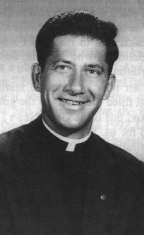I’m pleased to announce that my Debating Catholicism series now is available at Amazon in both ebook and paperback formats.
The series consists of five books: four that contain one debate each and a fifth omnibus volume that gathers together the four debates. On the My Books page of this website I list the titles and my opponents, so I won’t repeat that information here, but I want to say a few things about the men I traded public disagreements with.
Two of them are deceased, so they now have a keen awareness that, here below, they asked Pilate’s question, “What is truth?”, but answered it, for the most part, in the wrong way. A third man still pushes the anti-Catholic agenda, and the fourth fellow seems to have disappeared. I have been unable to track him down. He once had been a Catholic, so I hope that, in the years since we faced off, he has discovered, while still alive, what the two deceased men now know.
One of the deceased is Bart Brewer, a one-time priest. If he were still alive, he’d be 93. He was ordained in 1957 for the Discalced Carmelites, got into some trouble when posted to the Philippines, and at some point became a diocesan priest in San Diego. Years ago I spoke with local priests who had known Bart before he unpoped. They weren’t  complimentary, nor were they condemnatory. Bart seems to have been, at least early on, a fairly devout though not particularly knowledgeable priest. But something went awry, and he abandoned the Church.
complimentary, nor were they condemnatory. Bart seems to have been, at least early on, a fairly devout though not particularly knowledgeable priest. But something went awry, and he abandoned the Church.
Over the years I’ve encountered other professional anti-Catholics who once had been Catholics—and serious ones at that. It isn’t hard to imagine why someone might leave the Church. Lots of people have, but few of them slam the door behind themselves. Usually, like Douglas MacArthur’s “old soldiers,” they “just fade away.” Yet there are some who turn against the Church with such vehemence that they go into active opposition.
No doubt, in any one man there are multiple reasons for such turnings, but I always have suspected that there is an element of spite. It’s something like the young fellow whose long-time girlfriend jilts him. Before that, he praised her to the skies. Now, he complains about how worthless she always had been. To anyone who pays attention, his remarks say more about him than about her.
So it was, I suspect, with Bart, at least in part. It wasn’t enough for him just to turn in his clerical collar and become an insurance salesman who never said anything about his religion, who kept his private history private, who just melted into the crowd. As I mention in Face Off with an Ex-Priest, I always had a certain fondness for Bart. Maybe the fondness was mixed with pity. Other people find that life has dealt them a bad hand. In Bart’s case, he seems to have dealt the bad hand to himself.
However that might be, I must say I enjoyed editing the transcript of our debate, and of the other debates in the Debating Catholicism series, because I was able to relive important moments in my own development as an apologist. I may not have learned much (or any) theology from my opponents, but in each debate I learned something about the anti-Catholic ethos and something about myself.
Each debate took place some years ago, but the anti-Catholic charges that my opponents levied and that I tried to rebut are still around. They never seem to go away, even if their intensity varies from place to place and over time.